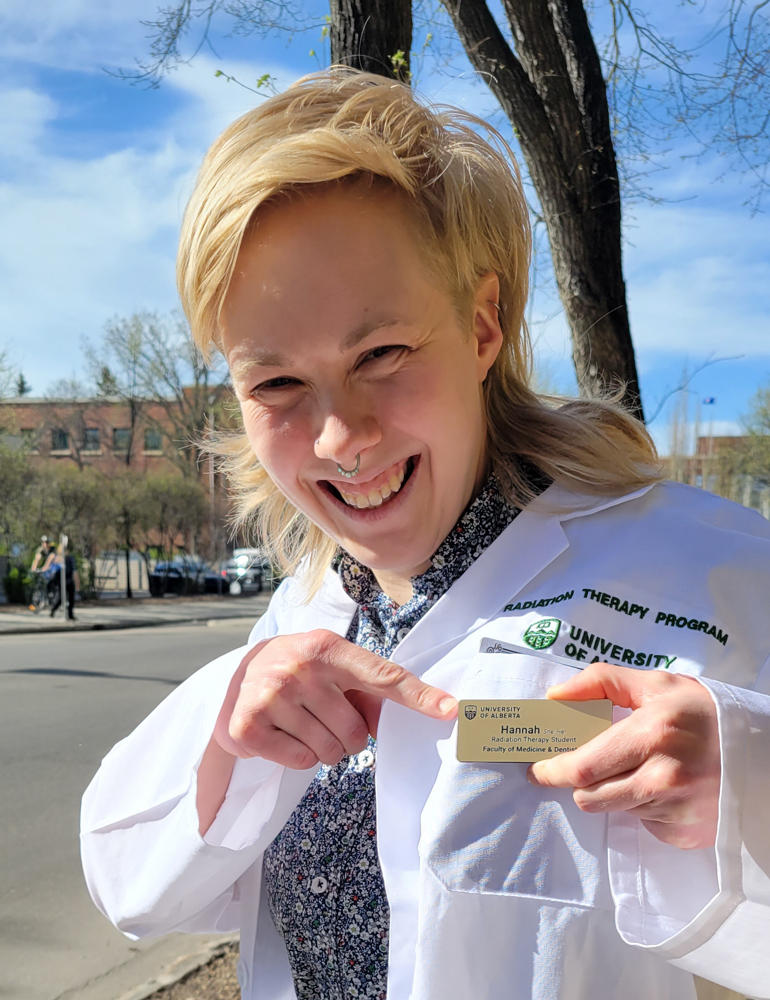Convocation Spotlight: Radiation Therapy '24 grad Hannah Lawson
5 June 2024

Radiation therapy '24 grad Hannah Lawson. Photo supplied.
Hannah Lawson was interested in a career that would allow her to make a direct, positive impact on people, and now that she is graduating from the University of Alberta with a bachelor of science in radiation therapy, she will have many opportunities to accompany patients through difficult moments in her new job at the Cross Cancer Institute.
Here, Lawson talks about the important research on radiation therapy for transgender and gender-diverse patients she produced during her final year and her advice for others interested in entering this demanding field.
What initially drew you to radiation therapy?
Radiation therapy seemed like the perfect marriage of intellectual stimulation with compassionate care. I really value the opportunity to walk encouragingly alongside people through some of their toughest days.
What are you most proud of from your time in the program?
I'm proud of the research I produced in fourth year, aimed at capturing the current care environment in radiation therapy as it pertains to transgender and gender-diverse patients. I found this area is incredibly under-researched and in dire need of exploration as the general population ages and more people who are gender diverse require cancer care. I'm happy that my research partner and I were able to start some important conversations and I hope this work is furthered by others in the future.
What was the biggest challenge you faced during your degree?
I would say managing my own wellness was sometimes a challenge, being an overachiever in a demanding program. Particularly during my fourth-year clinical practicum, I struggled to find the necessary balance between throwing myself all in and still maintaining the routines and habits that keep me mentally, physically and emotionally well.
How did you stay motivated and who helped you keep going when things got tough?
I was encouraged by previous graduates of the program who were able to assure me that life would get better after graduation, so seeing the finish line not too far off was motivational. Also, the fulfilment I felt during my fourth-year practicum, working directly with patients, was a good motivator. Key supports during this journey were my dad and stepmom, who were always my number 1 cheerleaders, and they provided me with a safe place to sometimes not be OK.
What advice would you give to a student thinking of entering this program?
Your training will not be an easy ride, so make sure you do your research and are sure about entering the profession first. It is an incredible career, however, and I feel so fortunate and excited for the opportunities ahead of me. I would also encourage students to approach their learning from the start with the mindset of using their lessons for the benefit of patients in the near future, as opposed to strictly being focused on their grades. Also, start making good notes at the start of the program — your future self studying for your national certification exam will thank you later. Another word of advice — make sure you sleep and eat well and have a good support system. Grades matter, but you matter more.
What have you learned about yourself?
Wow, so much that I can't even get into all of it here. One key thing I learned about myself as it relates to radiation therapy is that for some reason patients really trust me and value my care. I don't take this for granted, so I will strive to refine my patient-centred care skills by continually seeking enhanced education so that I am able to provide the most up-to-date and evidence-informed care for patients.
What comes next for you?
As an entry-level radiation therapist, there's still so much for me to learn. As I move into a radiation-therapist role at the Cross Cancer Institute, my aim is to squeeze every ounce of knowledge I can from more senior radiation therapists to enhance my practice. Additionally, I plan to publish my fourth-year research and will perhaps continue delving into qualitative research related to gender identity within oncology.